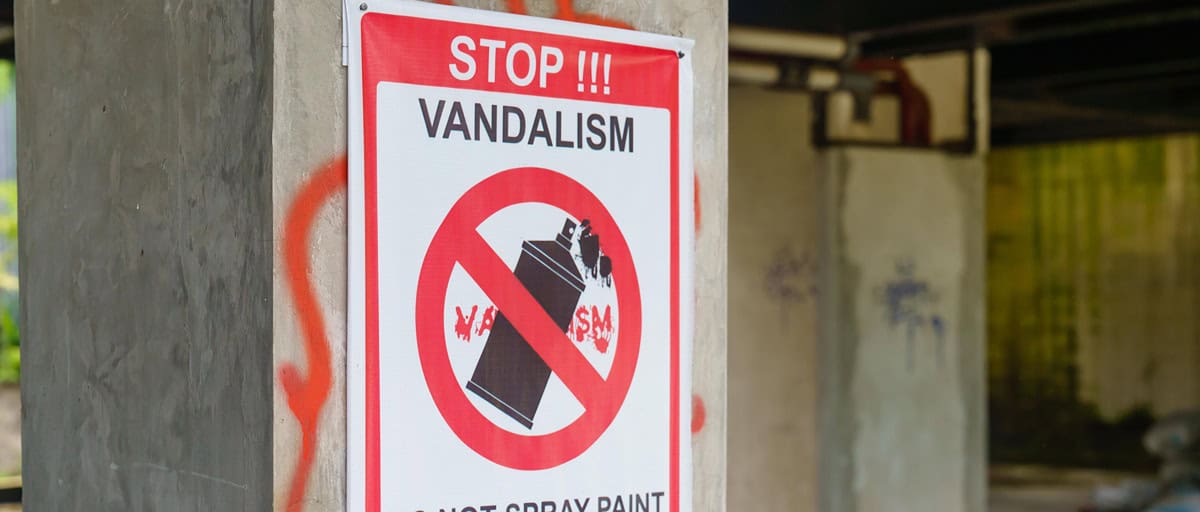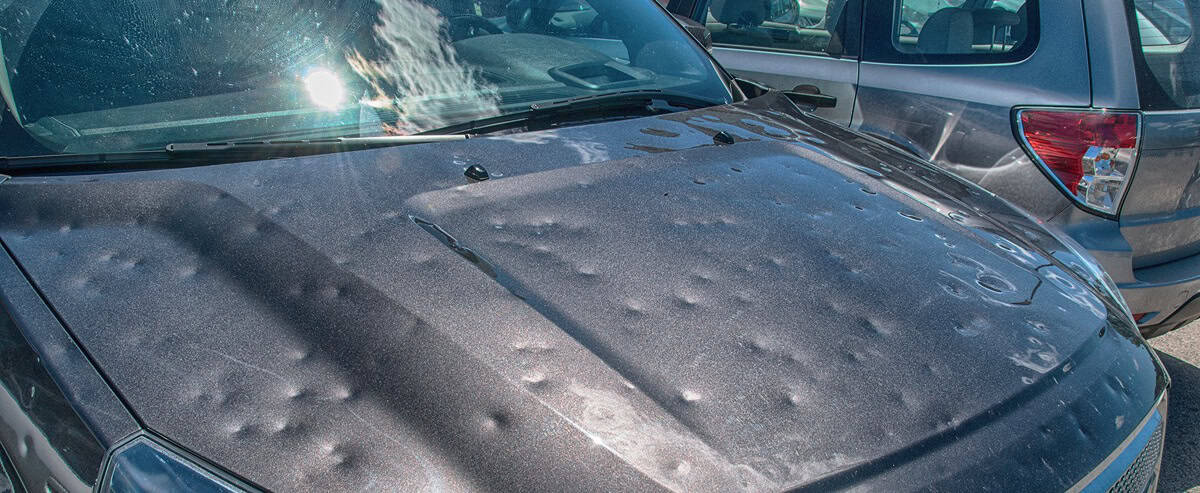Arizona has strict laws against vandalism, which is defined as intentionally destroying or defacing another person’s property without their permission. Depending on the extent of the damage and the value of the property affected, vandalism charges in Arizona can range from a misdemeanor to a felony charge.
If you have been accused of vandalism in Arizona, it is important to protect your rights and seek legal representation from a reputable law firm. Colburn Hintze Maletta is a team of experienced attorneys who specialize in criminal defense and can help achieve the best possible outcome for your case.
Get Immediate Help from Our Criminal Defense Attorneys.
We are Available to Talk Now.
Or, Continue Reading Below About:
Vandalism Charges and Penalties
How Does Arizona Law Define Vandalism
In Arizona, vandalism is legally defined under Arizona Revised Statutes (A.R.S.) § 13-1602 as criminal damage. The statute outlines specific actions that constitute this offense, emphasizing reckloess behavior and intentional acts that result in property damage. According to A.R.S. § 13-1602, a person commits criminal damage by:- Recklessly defacing or damaging property of another person.
- Recklessly tampering with property of another person, substantially impairing its function or value.
- Recklessly damaging property of a utility, which can disrupt essential services.
- Recklessly parking a vehicle in a manner that deprives livestock of access to the only reasonably available water.
- Recklessly drawing or inscribing a message, slogan, sign, or symbol on any public or private building, structure, or surface, excluding the ground, without the owner’s permission.
- Intentionally tampering with utility property, especially if it causes an imminent safety hazard.
What is Considered an Act of Vandalism?
In Arizona, vandalism encompasses a range of actions that result in damage or defacement of property, as outlined in Arizona Revised Statutes (A.R.S.) § 13-1602. The most common examples include:
- Graffiti: Unauthorized writing, drawing, or painting on buildings, fences, vehicles, or other surfaces.
- Breaking Windows: Deliberately shattering or damaging windows of homes, businesses, vehicles, or other structures.
- Damaging Signs: Defacing or destroying public or private signs, including traffic and business signs.
- Keying Cars: Scratching or damaging vehicle paintwork with sharp objects.
- Tampering with Utility Equipment: Interfering with equipment or property belonging to utilities, such as water, electricity, or gas infrastructure.
These acts are characterized by their unauthorized and reckless nature, leading to property damage or defacement. Vandalism can occur on both public and private property, with penalties varying based on the severity of the damage and the value of the affected property
What is Intent and Recklessness
The perpetrator’s state of mind—whether the act was done recklessly or intentionally—is a critical factor in defining vandalism. For example, an accidental knock that breaks a window may not be classified as vandalism, whereas intentionally throwing an object to break the window clearly falls under this offense.
What is Aggravated Criminal Damage?
Aggravated criminal damage is a more severe form of vandalism recognized under Arizona law. This offense is defined in Arizona Revised Statutes (A.R.S.) § 13-1604 and involves actions that result in significant harm or target specific types of property, leading to harsher penalties.
Here are the key aspects of aggravated criminal damage:
- Higher Damage Thresholds: This offense includes damage that exceeds certain monetary thresholds. For example, if the damage to property amounts to $10,000 or more, it is classified as a Class 4 felony. Similarly, damage to utility property amounting to $5,000 or more, or intentional tampering with such property causing an imminent safety hazard, also qualifies as a Class 4 felony.
- Targeting Specific Property: Aggravated criminal damage often involves properties of particular importance, such as religious or educational institutions, cemeteries, or public utilities. Damaging these types of properties can lead to more severe charges due to their critical nature and public interest.
- Intent to Intimidate or Assist Criminal Activity: If the act of damage is committed with the intent to promote, further, or assist a criminal street gang or syndicate, it can elevate the offense to aggravated criminal damage. This also applies if the damage is meant to intimidate individuals or groups.
- Classification and Penalties: The classification of aggravated criminal damage ranges from Class 4 to Class 6 felonies, depending on the extent and nature of the damage. Penalties may include imprisonment, hefty fines, and restitution to the victims. The classification is more severe compared to standard vandalism due to the greater impact and specific targeting involved.
Potential Penalties for Vandalism in Arizona
The penalties for vandalism in Arizona vary depending on the severity of the offense and the value of the property damaged.
Here is an overview of the potential penalties:
- Class 4 Felony:
- Applies if the damage to property amounts to $10,000 or more.
- Also includes damage to utility property amounting to $5,000 or more, or intentional tampering with such property causing an imminent safety hazard.
- Penalties may include up to 3.75 years in prison and substantial fines.
- Class 5 Felony:
- Applies if the damage to property is between $2,000 and $10,000.
- Also includes damage intended to promote, further, or assist a criminal street gang or syndicate.
- Penalties may include up to 2.5 years in prison and fines.
- Class 6 Felony:
- Applies if the damage to property is between $1,000 and $2,000.
- Penalties may include up to 2 years in prison and fines.
- Class 1 Misdemeanor:
- Applies if the damage to property is more than $250 but less than $1,000.
- Penalties may include up to 6 months in jail, fines, and restitution.
- Class 2 Misdemeanor:
- Applies if the damage to property is $250 or less.
- Penalties may include up to 4 months in jail, fines, and restitution.
In addition to the above penalties, individuals convicted of vandalism may be required to pay restitution to cover the cost of repairs and restoration of the damaged property. Courts may also impose community service, probation, or mandatory counseling, depending on the case’s circumstances.
| Classification | Criteria | Penalties |
|---|---|---|
| Class 4 Felony | Damage ≥ $10,000 or utility damage ≥ $5,000, or causing imminent safety hazard | Up to 3.75 years in prison, substantial fines |
| Class 5 Felony | Damage $2,000 – $10,000, or damage promoting criminal activity | Up to 2.5 years in prison, fines |
| Class 6 Felony | Damage $1,000 – $2,000 | Up to 2 years in prison, fines |
| Class 1 Misdemeanor | Damage $250 – $1,000 | Up to 6 months in jail, fines, restitution |
| Class 2 Misdemeanor | Damage < $250 | Up to 4 months in jail, fines, restitution |
Get Help From Experienced Criminal Defense Attorneys
Facing vandalism charges in Arizona can be intimidating, especially with the risk of severe penalties. The experienced attorneys at Colburn Hintze Maletta specialize in criminal defense, providing expert legal representation for those accused of vandalism. The team offers personalized legal strategies tailored to each client’s unique situation, ensuring a thorough defense. They are known for their aggressive advocacy, challenging evidence and seeking to reduce or dismiss charges. Beyond legal representation, Colburn Hintze Maletta provides support and guidance throughout the process, helping clients understand their rights and options. If you or a loved one faces vandalism charges, contact Colburn Hintze Maletta at (602) 825-2500 for a consultation and secure your defense.
Timothy Hintze is a well-respected and aggressive trial lawyer having represented clients in courts throughout the state of Arizona. He has litigated hundreds of criminal matters ranging from complex felony cases to misdemeanor offenses, as well as a dedicated advocate for family law clients. Tim was also awarded the distinction of being named a Super Lawyers Rising Star and selected by the National Trial Lawyers Association as a Top 40 Under 40 Attorney.
Always Available 24/7 for Legal Help Schedule an Appointment Today!
Call Us Now to Speak with an Attorney (602) 825-2500
Real Client Reviews
Below are just a few of what our clients have to say!











